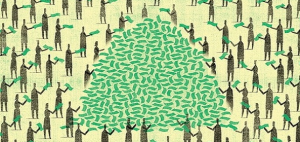In economic speak, resilience means the ability for economies to prevent and withstand shocks.
The financial crisis of 2008 was a reminder that a thriving economy doesn’t mean a resilient one.
The economy is still pumping out reasonable signals and lower rates and quantitative easing introduced by the Bank of England have plugged the leaks, but Brexit result may yet prove to be a test of the UK’s shaky-seeming foundations.
As Stephen Hawking said:

“Does money matter? Does wealth make us rich any more? These might seem like odd questions for a physicist to try to answer, but Britain’s referendum decision is a reminder that everything is connected and that if we wish to understand the fundamental nature of the universe, we’d be very foolish to ignore the role that wealth does and doesn’t play in our society.”
What has alternative finance got to do with creating economic resilience in the face of massive political upheaval?
Alternative finance, a term that refers to peer to peer, crowdfunding, community share schemes etc, could be a key pillar of support for the UK economy as it moves through this transition phase.
This is because these new platforms and providers offer are a way of bypassing banks and the largely self-serving financial services industry, instead delivering better value to savers and investors and re-routing capital into much needed local businesses, infrastructure and manufacturing.

A new report, Financial Innovation Today: Towards Economic Resilience (FITTER), from the Bauman Institute at the University of Leeds on behalf of the Friends Provident Foundation, echoes this.
It argues that as a nation we need to develop a better understanding of economics and finance if we are ever to have a truly resilient economy.
It suggests that mainstream economics and mainstream finance have got fat on our collective lack of understanding of economic and monetary value and that mainstream providers often work to “obscure a better understanding of economic life such that the population is extremely risk-averse and willing to acquiesce to the wisdom of professional experts.”
It argues that the mainstream finance sector is like a dragon about to wake up and “steal” all the good the alternative sector has created.
For a more resilient, ‘real economy’ (local businesses, infrastructure and community projects that generate social and environmental benefits as well as a financial return) to really grow, then the alternative finance sector will need to do more to build a reputation for transparency and trust at a time when faith in the mainstream financial sector is low, but confusion and inertia still reign supreme. So-called “altfin” needs to be more like a Trojan Horse, transforming the mainstream from within.
The report concludes that the alternative finance movement represents something of great significance to us all – a promise that together we can build a better, fairer and more resilient financial system that meets the needs of society, and not just the economy.
It suggests that alternative finance has the potential to transform the financial system, but that this alone cannot build resilience. Building resilience requires more than narrow economics. It also requires the creation of social and environmental value genuinely co-produced between the market, the state and society in a fair inclusive and democratic way.
Bring it on.
If you would like to read the report in full you can download it here.



